 Petzlover
Petzlover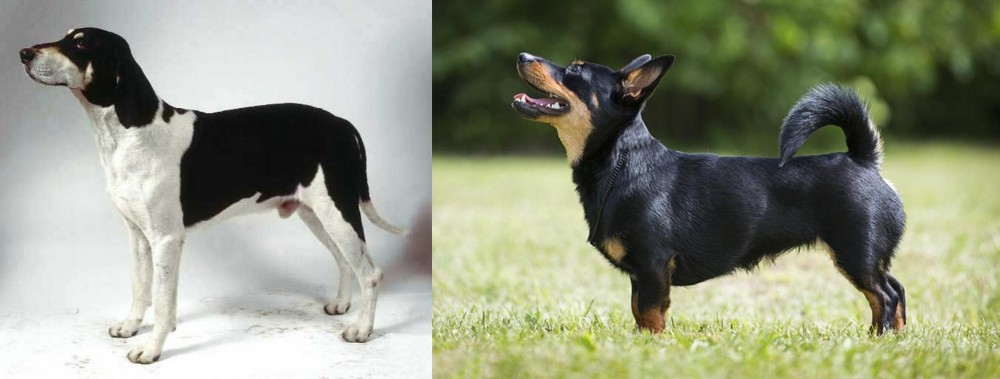 Francais Blanc et Noir is originated from France but Lancashire Heeler is originated from United Kingdom. Francais Blanc et Noir may grow 41 cm / 17 inches higher than Lancashire Heeler. Francais Blanc et Noir may weigh 26 kg / 58 pounds more than Lancashire Heeler. Both Francais Blanc et Noir and Lancashire Heeler has almost same life span. Both Francais Blanc et Noir and Lancashire Heeler has almost same litter size. Francais Blanc et Noir requires Moderate Maintenance. But Lancashire Heeler requires Low Maintenance
Francais Blanc et Noir is originated from France but Lancashire Heeler is originated from United Kingdom. Francais Blanc et Noir may grow 41 cm / 17 inches higher than Lancashire Heeler. Francais Blanc et Noir may weigh 26 kg / 58 pounds more than Lancashire Heeler. Both Francais Blanc et Noir and Lancashire Heeler has almost same life span. Both Francais Blanc et Noir and Lancashire Heeler has almost same litter size. Francais Blanc et Noir requires Moderate Maintenance. But Lancashire Heeler requires Low Maintenance
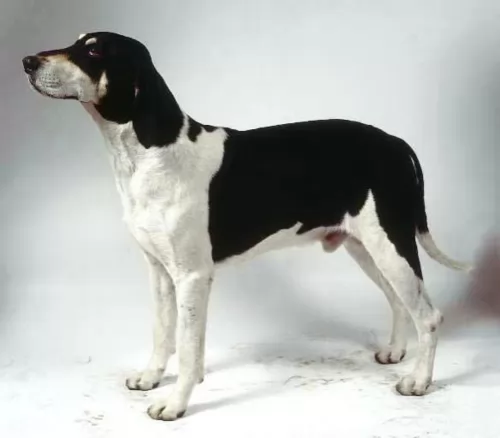 Translated from the French Chien Francais Blanc et Noir, is the French White and Black Hound. His ancestry goes back before the French Revolution to the old Hound of Saintonge and the Gascon Saintongeois. The Francais Blanc et Noir was bred to be a hunting dog and he is a scent hound. They were dogs that went hunting in packs, mostly for Roe and Red deer. In the late 19th Century, the Gascon Saintongeois was crossed with the Poitevin and the result was the Francais Blanc et Noir.
Translated from the French Chien Francais Blanc et Noir, is the French White and Black Hound. His ancestry goes back before the French Revolution to the old Hound of Saintonge and the Gascon Saintongeois. The Francais Blanc et Noir was bred to be a hunting dog and he is a scent hound. They were dogs that went hunting in packs, mostly for Roe and Red deer. In the late 19th Century, the Gascon Saintongeois was crossed with the Poitevin and the result was the Francais Blanc et Noir.
The breed was recognized in 1957 and by 2009 there were about 2000 dogs registered with the Federation Cynoloqique Interenationale. There are three types of the Francais line. They are the Chien Francais Tricolor and Chien Francais Blanc et Orange. The Blanc et Noir was bred as a hunting dog and they remain that especially in France. However, they are also very popular in dog shows. Because so many dogs belonged to hunters who felt no compulsion to register them, they were not recognized internationally for many decades later than they should have been.
Following the Second World War, breeding programs were in chaos and hunters were abandoning dogs that they could not feed. The military killed many dogs also. The Chien Francais Blanc et Noir saw its ranks greatly depleted but the breed survived. After being recognized in 1957 by the CKC and FCI, they gained international attention for the first time. Even though the breed is rare its numbers are greater than either of the other Chien Francais types. The breed registers 200 to 400 new dogs every year.
They are still endangered though because there are very few dogs left outside of France.
The UKC has recognized the breed but the AKC doesn’t.
 The Lancashire Heeler, known also as the Ormskirk Heeler or Ormskirk Terrier, hails from England and is looked upon as a vulnerable breed by the Kennel Club in the 21st century.
The Lancashire Heeler, known also as the Ormskirk Heeler or Ormskirk Terrier, hails from England and is looked upon as a vulnerable breed by the Kennel Club in the 21st century.
He was developed to be a cattle drover, but is essentially a companion dog today. Exact details of the origin of the Lancashire are unknown, but it is generally accepted that Welsh Corgis were used as well as a kind of black and tan terrier known as the Manchester Terrier.
In England, he has been known as a general working dog for more than a century.Gwen Mackintosh began breeding these dogs in the 1960s and the Lancashire Heeler Club was established in 1978. The dog was also placed on the Endangered Breeds in 2003.
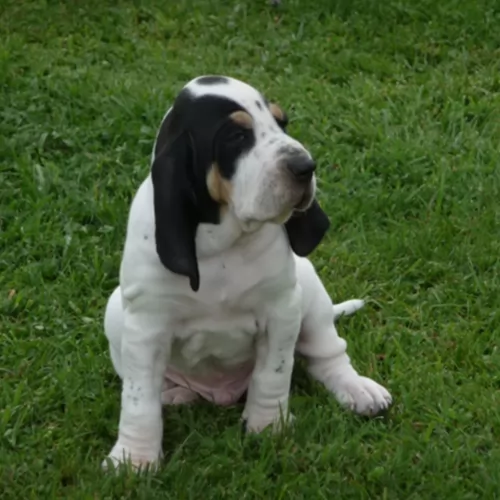 Being a pack hunting dog, the Francais Blanc et Noir is muscular and lean. A long legged athletic breed with long drop ears, a domed head, and flews overhanging the lower lip. The coat is black and white, with black and blue ticking. There are tan dot on the cheeks and above the eyes and also below the tail. These spots of pale tan color can also appear on the dog’s legs. The Francais Blanc et Noir is known for its scenting ability and for its great voice. With its athletic build it is also known for its ability to persevere
Being a pack hunting dog, the Francais Blanc et Noir is muscular and lean. A long legged athletic breed with long drop ears, a domed head, and flews overhanging the lower lip. The coat is black and white, with black and blue ticking. There are tan dot on the cheeks and above the eyes and also below the tail. These spots of pale tan color can also appear on the dog’s legs. The Francais Blanc et Noir is known for its scenting ability and for its great voice. With its athletic build it is also known for its ability to persevere
 As a small breed dog, the Lancashire Heeler stands at 25 – 31cm in height, both male and female, and the dog weighs in the region of 2 to 6kg.
As a small breed dog, the Lancashire Heeler stands at 25 – 31cm in height, both male and female, and the dog weighs in the region of 2 to 6kg.
Looking quite similar to a Corgi or a German Shepherd with short legs, the Heeler’s legs are meant to be fairly straight and not bandy-legged. He has a short, weather-proof coarse coat that can be black or liver-colored, with tan markings. The coat is regarded as low maintenance. The hair is slightly longer around his neck.
The ears are erect, the eyes brown and bright and the tail these days is left long with a slight curl.
Intelligent, stubborn, strong willed, playful and friendly, the Lancashire Heeler is capable of making you an excellent pet and companion.
This dog is smart and learns quickly. He is energetic and playful, strong and robust and more than willing to take part in all the activities that you’re taking part in.
With training and socialization he makes a splendid pet, but he doesn’t put up well to abuse and disrespect from younger children. He is willing to get along with other pets in the home too.
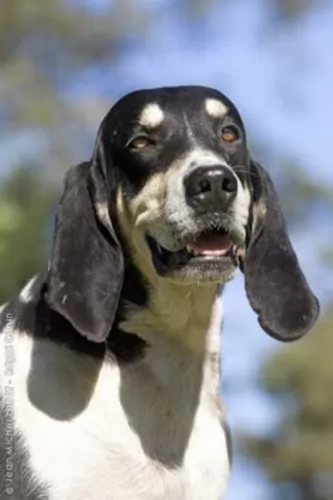 They are good with children as long as the children are not overly rambunctious.
They are good with children as long as the children are not overly rambunctious.
He is a large active dog that would not be adaptable to apartment or city life.
The breed is very smart and easily trainable.
 As with any dog breed, there are wide variations in temperament. A dog essentially turns out the way it was brought up, similar to a child. Angry, harsh, aggressive, uncaring dog owners produce a dog that is both timid and aggressive, unsure, frustrated and with behavioral problems.
As with any dog breed, there are wide variations in temperament. A dog essentially turns out the way it was brought up, similar to a child. Angry, harsh, aggressive, uncaring dog owners produce a dog that is both timid and aggressive, unsure, frustrated and with behavioral problems.
Make your dog part of your family, provide him with good food, exercise and love and he will make an awesome pet.
The Lancashire Heeler is such an amicable, social dog at heart, and treated well, he will turn out like is inherent characteristics. He is an outgoing, friendly dog, more so when he has been trained and socialized. He will adapt to city- or country life, so long as he is exercised each day.
The Heeler has a good, balanced temperament, and counted in as a loved family member, you’ll make sure he stays that way.
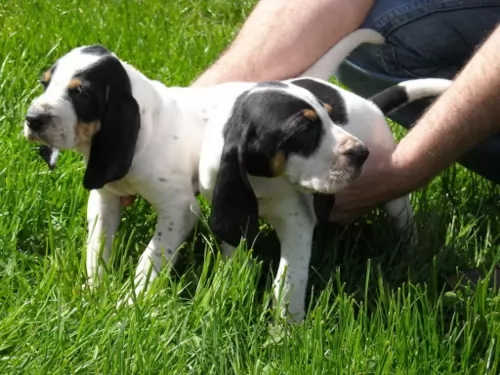 The Francais Blanc et Noir has the propensity for several minor and a few major health problems. These include:
The Francais Blanc et Noir has the propensity for several minor and a few major health problems. These include:
Can lead to death if not treated immediately. Stomach twists and distends.
Can lead to arthritis and lameness if not treated.
These can be avoided if ears are checked and cleaned after each hunt and after exercise.
The breed is susceptible to the non-fatal type. Check for mites regularly.
Both seasonal and food potentially.
 Your Heeler can live to be 14, 15 or 16 years of age and live even longer than this with the right care. He is such a healthy breed, but one of the common dog illnesses to look out for are eye diseases.
Your Heeler can live to be 14, 15 or 16 years of age and live even longer than this with the right care. He is such a healthy breed, but one of the common dog illnesses to look out for are eye diseases.
This is where the ligaments of the eye are weakened so that the lens actually loosened and then displaced, causing pain for the dog. This displacement can obstruct fluid drainage from the eye too and your vet may need to perform surgery.
The shock-absorbing intervertebral discs can have spinal compression and contribute to significant pain for your pet. Early signs will see your Lancashire Heeler being reluctant to jump on his chair like he may once have done. Preventing obesity is important for reducing pressure on the dog’s spine.
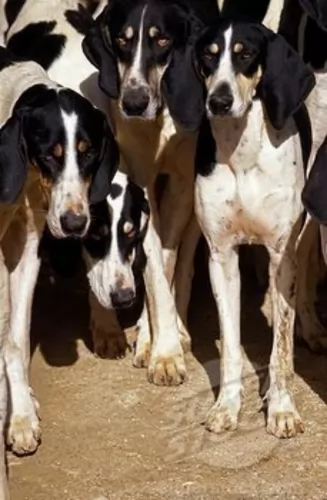 Until a year to 18 months feed two to three times per day two to two and one half cups of high quality dry dog food.
Until a year to 18 months feed two to three times per day two to two and one half cups of high quality dry dog food.
After 18 months of age feed the adult at least twice a day about three to four and one half cups of high quality dry dog food.
The Francais Blanc et Noir is a dog with a lot of energy and bred to be very active. He needs plenty of exercise and both mental and physical stimulation. If you jog take him with you or take him on long walks every day. He will need a large yard and he needs a job if he is not used for hunting. He is good at field trials, tracking exercises, a search and rescue dog and barn hunts.
 Known as a low maintenance dog, the Lancashire Heeler’s short coat will require little grooming, just a good brush twice a week.
Known as a low maintenance dog, the Lancashire Heeler’s short coat will require little grooming, just a good brush twice a week.
If your Heeler doesn’t wear his nails down naturally, they will need to be clipped as part of the grooming process. Ears should also be checked regularly. Excess wax and dirt can build up which can lead to an ear infection. This can drive your dog mad with frustration. Teeth also need to be brushed regularly.
Remember, if you feel guilty for not getting to grooming your pet, there are professional groomers at your local vet or who work independently and they will do all of this for you.
Your Lancashire Heeler is such a social, active little dog who is always willing to be counted in to all your fun and games. If you’re lucky to have a fair sized garden, involve him in some ball games, or use a rope for him to tug on while you pull the other side. Whenever you go for a walk, he will be thrilled to join you as he loves picking up all those new scents outside his garden.
Nutritious food is important for longevity and health in a dog. Every dog has different dietary needs throughout their lives – when they’re puppies, when the female is pregnant, after they’ve been spayed or neutered, as a working dog, when they’re sick, when they’re old and so on.
There are some good dog brand foods to use, but you want to choose the best ones to ensure your dog gets all the vitamins and minerals needed as opposed to those that are packed with colorants, preservatives and fillers.
Home-made food is important too and some cooked chicken, cooked rice and raw or cooked vegetables can be added to his dry kibble from time to time. Don’t complicate your dog’s diet – just feed him plain, wholesome food like this with a little bit of raw meat added in occasionally. Simple, nutritious food will ensure he is energetic, bright eyed and happy. Make sure he always has fresh, cool water.